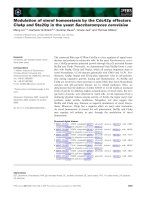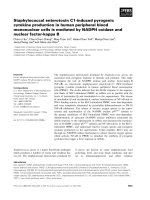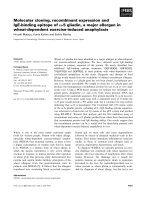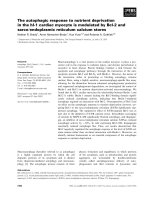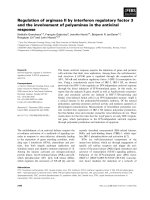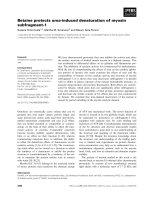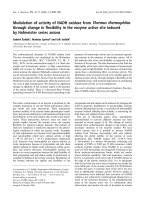Báo cáo khoa học: "Pathological complete response induced by first-line chemotherapy with single agent docetaxel in a patient with advanced non small cell lung cancer" pptx
Bạn đang xem bản rút gọn của tài liệu. Xem và tải ngay bản đầy đủ của tài liệu tại đây (1.07 MB, 4 trang )
CAS E REP O R T Open Access
Pathological complete response induced by
first-line chemotherapy with single agent
docetaxel in a patient with advanced non small
cell lung cancer
Ferdinando Riccardi
1*
, Giuseppe Di Lorenzo
1
, Carlo Buonerba
1
, Guglielmo Monaco
2
, Roberto Monaco
3
,
Mimma Rizzo
1
, Sarah Scagliarini
1
, Florinda Scognamiglio
1
, Marilena Di Napoli
1
, Giacomo Carteni’
1
Abstract
Background: Defining the optimal treatment for patients with inoperable non small cell lung cancer (NSCLC),
presenting with metastatic mediastinal lymph nodes, is challenging. Nevertheless, preoperative chemotherapy or
radiotherapy might offer a chance for these patients for radical surgical resection and, possibly, complete recovery.
Case Presentation: A 62-year old man with IIIA-N2 inoperable NSCLC was treated with first-line single agent
docetaxel. A platinum-based treatment, though considered more active, was ruled out because of renal impairment.
The patient tolerated the treatment very well and, although his initial response was not impressive, after 14 cycles he
obtained a complete clinical response, which was confirmed pathologically after he underwent surgical lobectomy.
Conclusion: In non-operable NSCLC patients not eligible for a platinum-based treatment, single-agent docetaxel
can provide complete pathologic responses. Failure to obtain a response after the first few cycles should not
automatically discourage to continue treatment.
Introduction
In non-small cell lung cancer (NSCLC), mediastinal
lymphnode involvement comprises a wide spectrum of
severity. In fact, while 9% of patients with IIIA-N2
NSCLC is candidate for surgery at diagnosis, with a 5-
year survival of 20-30%, the majority of patients with
stage IIIA-N2 and IIIB-N2 tumors cannot undergo up-
front surgical resection and present a 5-year survival
rate of about 5%[1]. There is a growing body of evidence
that suggests that neoadjuvant chemotherapy or radio-
therapy or chemoradiotherapy prior to surgery can be
advantageously employed in patients with stage IIIA-N 2
disease[2]. We herein describe an unusual case of patho-
logical complete response induced by single agent doce-
taxel chemotherapy in a patient with diagnosis of
NSCLC initially judged not fit for surgical resection.
Case Presentation
A 62-year-old man was referred to Cardarelli Hospital,
Naples, in June 2008. He presented a 4-month history of
non productive c ough, progressive shortness of breath,
increasing abdominal girth and anorexia. He was mildly
dyspnoeic at rest and complained about severe asthenia.
There was no alcohol abuse in the previous ten years,
while he presented an 80-pack-a year history of cigarette
use, as he had smoked since the age of 18 until recently.
An abnormal shadow appeared on the patie nt’s chest X-
ray, w hile a CT scan re vealed a right hilar tumor, mea-
suring 92 × 66 mm, as shown in Figure 1.
Afiberopticbronchoscopyindicatedthepresenceof
an endobronchial lesion infiltrating the upper lobar
bronchus of the r ight lung. Pathological analysis with
CT-guided fine-needle aspiration biopsy (FNAB) of the
collected specimens showed that the tumor was a
poorly differentiated squamous cell carcinom a. There
was no evidence of extra thoracic metastasis on bra in
MRI, abdominal CT and FDG-PET scans. Therefore,
the patient had a stage IIIA-N2 NSCLC.
* Correspondence:
1
UOC Oncologia, Ospedale Cardarelli, Napoli, Italy
Riccardi et al. World Journal of Surgical Oncology 2010, 8:8
/>WORLD JOURNAL OF
SURGICAL ONCOLOGY
© 2010 Riccardi et al; licensee BioMed Central Ltd. This is an Open Access article distributed under the terms of the Creative Commons
Attribution License ( which permi ts unrestricted use, distribution, and reproduction in
any medium, provided the original work is properly cited.
Blood tests revealed a mild renal failure with an esti-
mated creatinine clearance of 47 ml/min. Considering
the impaired renal function, a platinum-base d treat-
ment was ruled out. Therefore, the patient was started
on single-agent docetaxel induction chemotherapy (75
mg/sqm over 60 min on day 1, every 3 weeks). The
first evaluation was made after four cycles. In Septem-
ber 2008, a CT scan showed a partial response of the
carcinoma, which appeared to measure 65 × 41 mm.
The safety profile was good, with patient reporting
grade 1 ane mia, grade 3 neutropenia without fever,
weight loss inferior to 10% and asthenia. Therefore,
the treatment was continued for four additional cycles.
In January 2009, a CT scan showed an impressive
shrinkage of the hilar mass, measuring 35 × 30 mm.
There also was a marked clinical improvement, as the
cough and the dyspnoea had disappeared and the
patient reported a general feeling of wellness. Consid-
ering the patient’ s good compliance, it was decided to
continue the same treatment until progression or
unacceptable toxicity. After 14 cycles, both CT and
PET scans showed further tumor response, as the right
hilar mass measured only 16 × 10 mm, and the patient
was finally judged to be eligible for surgery (figures 2
and 3). The c hest surgeon decided to perform a right
lobectomy with mediastinal lymph node sampling. On
pathological examination, the response to induction
chemotherapy was complete.
Discussion
Preoperative, platinum-based combination chemother-
apy is safe and active in NSCLC, although a randomized
trial reported a modest, not statistically significant
excess of post-surgical morbidity and mortality[3]. As
single-agent therapy is associated to a lower response
rate, but also to lower toxicity[ 4], single-agent docetaxel
Figure 1 CT scan on June 2008.
Figure 2 Chest computed tomography scan (A) before
treatment of docetaxel (B) 10 months after treatment. The
arrows show the mediastinal lymph node metastasis that gradually
reduced in size.
Riccardi et al. World Journal of Surgical Oncology 2010, 8:8
/>Page 2 of 4
chemotherapy might b e feasible f or preoperative t her-
apy, especially in the context of an early stage disease to
be cured with surgery and adjuvant therapy, as well. A
phase III trial randomized patients with stage IIIA or
locally treatable IIIB NSCLC to neoadjuvant docetaxel
(up to three 3-weekly cycles at 100 mg/m
2
, 134 patients)
or no chemotherapy (140 patients) prior to surgery/
curative-intention radiotherapy. Treatment proved to be
safe and well tolerated, but this trial showed only a
trend in survival prolongation (14.8 months in the che-
motherapy group vs. 12.6 months in the control group,
not statistically significant)[5]. A multicenter phase III
trial indicated that patients with advanced NSCLC
receiving the combination of docetaxel and cisplatin
(DC) had a statistically significant improvement in
objective response rate compared with patients treated
with docetaxel alone (D), although there was no statisti-
cally significant difference in overall survival (36% vs.
18% and 10.5 vs. 8.0 months, respectively). Furthermore,
patients treated with single-agent docetaxel had a more
favorable t oxicity profile than patients treated with DC.
In particular, there were important d ifferences in the
incidence of: (a) grade 2 anemia, (b) grade 3/4 nausea/
vomiting, diarrhea, and neurotoxicity, (c) nephrotoxicity
of any grade and (d) treatment-related deaths ( 5 in the
DC arm vs 1 in the D arm)[6].
Similarly, the toxicity profile of the monotherapy arm
in the Lilenbaum [7] study was more favorable com-
pared with that of the combination arm, with no differ-
ence in survival.
Although it is generally believed that best responses
are obtained in patients who initially respond to doce-
taxel treatment, the case presented herein proves how
an unexpected, striking complete pathologic response
can be achieved with a long-term treatment, which was
substantially well tolerate d. Such an observation, if con-
firmed by large-sample studies, might indicate how an
unsatisfactory initial response, but not progressive dis-
ease, does not con stitute a reliable predictive factor for
response, as a great improvement in response itself can
sti ll be obtai ned, if treatment is continued. Noteworthy,
such a result appears to be in contrast with observations
regarding neo-adjuvant docetaxel-based chemotherapy
in other inoperable malignant tumors, such as breast
cancer[8].
Surprisingly, a complete pathologic response was not
obtained with a platinum-based regimen, but with sin-
gle-agent docetaxel, which is not considered to be t he
first-line chemotherapy for non-operable patients with
NSCLC. The search for either molecular or genetic mar-
kers predictive for docetaxel sensiti vity might constitute
future targets of investigation.
Finally, we cannot but underline our decision not to
suspend treatment as soon as the patient was considered
to be eligible for surgery. In fact, our choice to continue
docetaxel chemotherapy resulted in further tumor
shrinkage, with no additional toxicity, and gave the
patient the possibility to undergo a lobectomy rather
than a pneumectomy, with the obvious advantages of a
less invasive and more limited surgical operation. Our
Figure 3 (A) CT scan June 2008 before therapy. (B) CT scan April 2009 after therapy.
Riccardi et al. World Journal of Surgical Oncology 2010, 8:8
/>Page 3 of 4
patient obtained a striking response to docetaxel as first-
line monotherapy treatment and could undergo an
upper right lobectomy with radical intent. Microscopic
examination showed a pathological complete response
of the neoplasia.
Conclusion
Our results suggest that physicians sh ould be aware of
potential objective responses to Docetaxel, as first-line,
for patients with limitations to receive platinum-based
regimens, even after the tumor does not seem to be
reduced in size at the beginning phase of the treatment.
Consent
Written informed consent was obtained from the patient
for publication of this case report and accompanying
images. A copy of the written consent is available for
review by the Editor-in-Chief of this journal.
Conflict of interests
The authors declare that they have no c ompeting
interests.
Author details
1
UOC Oncologia, Ospedale Cardarelli, Napoli, Italy.
2
UOC Chirurgia Toracica,
Ospedale Cardarelli, Napoli, Italy.
3
UOC Anatomia Patologica, Ospedale
Cardarelli, Napoli, Italy.
Authors’ contributions
FR, GDL and GC conceived of the study, coordination and writing
manuscript;
GM diagnosed the cancer with fiberoptic bronchoscopy and decided to
perform a right lobectomy; RM: Pathologist and author of diagnosis of
poorly differentiated squamous cell carcinoma;CM, MR, SS, FS, MDN
esamined the patient at follow-up.
Received: 12 November 2009
Accepted: 5 February 2010 Published: 5 February 2010
References
1. Albain KS: Induction therapy followed by definitive local control for
stage III non-small-cell lung cancer. A review, with a focus on recent
trimodality trials. Chest 1993, 103(Suppl):43-50S.
2. Eberhardt W, Gauler T, Pöttgen C, Krbek T, Korfee S, Stamatis G, Stuschke M:
Multimodality treatment of stage IIIA and IIIB non-small cell lung cancer.
J Thorac Oncol 2007, 2(5 Suppl):S35-6.
3. Depierre A, Milleron B, Moro-Sibilot D, Chevret S, Quoix E, Lebeau B,
Braun D, Breton JL, Lemarié E, Gouva S, Paillot N, Bréchot JM, Janicot H,
Lebas FX, Terrioux P, Clavier J, Foucher P, Monchâtre M, Coëtmeur D,
Level MC, Leclerc P, Blanchon F, Rodier JM, Thiberville L, Villeneuve A,
Westeel V, Chastang C, French Thoracic Cooperative Group: Preoperative
chemotherapy followed by surgery compared with primary surgery in
resectable stage I (except T1N0), II, and IIIa non-small-cell lung cancer. J
Clin Oncol 2002, 20:247-53.
4. Delbaldo C, Michiels S, Syz N, Soria JC, Le Chevalier T, Pignon JP: Benefits
of adding a drug to a single-agent or a 2-agent chemotherapy regimen
in advanced non-small-cell lung cancer: a meta-analysis. JAMA 2004,
292:470-84.
5. Mattson KV, Abratt RP, ten Velde G, Krofta K: Docetaxel as neoadjuvant
therapy for radically treatable stage III non-small-cell lung cancer: a
multinational randomised phase III study. Ann Oncol 2003, 14:116-22.
6. Georgoulias V, Pallis AG, Kourousis C, Alexopoulos A, Ardavanis A,
Agelidou A, Agelidou M, Toumbis M, Tzannes S, Pavlakou G, Ziotopoulos P,
Tzelepatiotis E, Samaras N: Docetaxel versus docetaxel/cisplatin in
patients with advanced non-small-cell lung cancer: preliminary analysis
of a multicenter, randomized phase III study. Clin Lung Cancer 2003,
4:288-93.
7. Lilenbaum RC, Herndon JE, List MA, Desch C, Watson DM, Miller AA,
Graziano SL, Perry MC, Saville W, Chahinian P, Weeks JC, Holland JC,
Green MR: Single-agent versus combination chemotherapy in advanced
non-small-cell lung cancer: the cancer and leukemia group B (study
9730). J Clin Oncol 2005, 23:190-6.
8. Heys SD, Hutcheon AW, Sarkar TK, Ogston KN, Miller ID, Payne S, Smith I,
Walker LG, Eremin O: Aberdeen Breast Group. Neoadjuvant docetaxel in
breast cancer: 3-year survival results from the Aberdeen trial. Clin Breast
Cancer 2002, , Suppl: S69-74.
doi:10.1186/1477-7819-8-8
Cite this article as: Riccardi et al.: Pathological complete response
induced by
first-line chemotherapy with single agent docetaxel in a patient with
advanced non small cell lung cancer. World Journal of Surgical Oncology
2010 8:8.
Submit your next manuscript to BioMed Central
and take full advantage of:
• Convenient online submission
• Thorough peer review
• No space constraints or color figure charges
• Immediate publication on acceptance
• Inclusion in PubMed, CAS, Scopus and Google Scholar
• Research which is freely available for redistribution
Submit your manuscript at
www.biomedcentral.com/submit
Riccardi et al. World Journal of Surgical Oncology 2010, 8:8
/>Page 4 of 4
